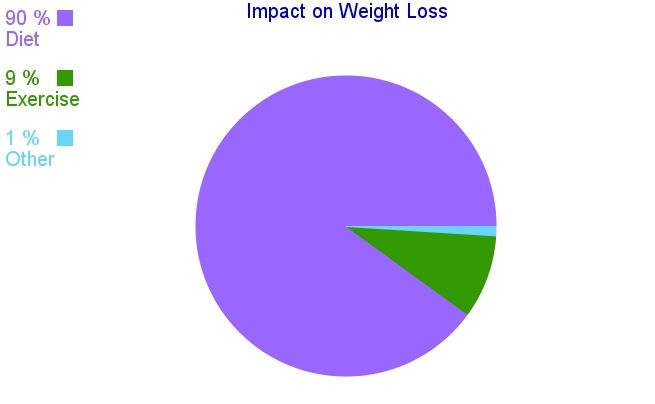the weight loss pie chart

nehushtan
Posts: 566 Member
Here's a pie chart that I whipped up recently:

First of all I should point out that the numbers in this chart are fairly arbitrary and that I have consulted no peer reviewed journals or authoritative sources to validate their precision. Who cares. The point is that most of the arguments about weight loss seem to be focused on that little sliver on the right side of the chart.
The most important factors are diet and exercise, diet being predominant. It’s really just the energy equation – energy in and energy out – that has the greatest impact. Sure, other things may or may not help. But not much.
You could do a lot of analysis and spend a great deal of time and energy and dollars studying the relative effect, for example, of one diet pill versus another and conclude that pill A performed “50% better” than pill B. Pretty significant, eh? But using pill A, then, would only affect your overall weight loss performance by one half of one percent, so its performance data is hardly worth knowing.
What else do you hear argued about that falls in that category? I'll throw out one: eating after 6:00 PM. A study was published recently that seemed to show that late-night eating was worse than middle-of-the-day eating. Maybe the study is right, but I'll wager the impact of this is trivial compared to the energy equation.
Any others?

First of all I should point out that the numbers in this chart are fairly arbitrary and that I have consulted no peer reviewed journals or authoritative sources to validate their precision. Who cares. The point is that most of the arguments about weight loss seem to be focused on that little sliver on the right side of the chart.
The most important factors are diet and exercise, diet being predominant. It’s really just the energy equation – energy in and energy out – that has the greatest impact. Sure, other things may or may not help. But not much.
You could do a lot of analysis and spend a great deal of time and energy and dollars studying the relative effect, for example, of one diet pill versus another and conclude that pill A performed “50% better” than pill B. Pretty significant, eh? But using pill A, then, would only affect your overall weight loss performance by one half of one percent, so its performance data is hardly worth knowing.
What else do you hear argued about that falls in that category? I'll throw out one: eating after 6:00 PM. A study was published recently that seemed to show that late-night eating was worse than middle-of-the-day eating. Maybe the study is right, but I'll wager the impact of this is trivial compared to the energy equation.
Any others?
0
This discussion has been closed.
Categories
- All Categories
- 1.4M Health, Wellness and Goals
- 398.5K Introduce Yourself
- 44.7K Getting Started
- 261K Health and Weight Loss
- 176.4K Food and Nutrition
- 47.7K Recipes
- 233K Fitness and Exercise
- 462 Sleep, Mindfulness and Overall Wellness
- 6.5K Goal: Maintaining Weight
- 8.7K Goal: Gaining Weight and Body Building
- 153.5K Motivation and Support
- 8.4K Challenges
- 1.4K Debate Club
- 96.5K Chit-Chat
- 2.6K Fun and Games
- 4.8K MyFitnessPal Information
- 18 News and Announcements
- 21 MyFitnessPal Academy
- 1.5K Feature Suggestions and Ideas
- 3.2K MyFitnessPal Tech Support Questions